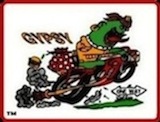NCOM Coast to Coast Legislative Update for December 2010
December/21/2010
By Bill Bish
12/21/2010
12/21/2010
THE AIM/NCOM MOTORCYCLE E-NEWS SERVICE is brought to you by Aid to Injured Motorcyclists (A.I.M.) and the National Coalition of Motorcyclists (NCOM), and is sponsored by the Law Offices of Richard M. Lester. If you’ve been involved in any kind of accident, call us at 1-(800) ON-A-BIKE or visit www.ON-A-BIKE.com.
COAST TO COAST BIKER NEWS
Compiled & Edited by Bill Bish,
National Coalition of Motorcyclists (NCOM)
QUOTABLE QUOTE: "The two enemies of the people are criminals and government, so let us tie the second down with the chains of the constitution so the second will not become the legalized version of the first."
Thomas Jefferson (1743-1826), 3rd President of the United States and principal author of the Declaration of Independence
NHTSA STILL PUSHING MOTORCYCLE-ONLY CHECKPOINTS NATIONWIDE
The National Highway Traffic Safety Administration (NHTSA) has ignored congressional requests to halt or delay a plan to implement and fund motorcycle-only checkpoints nationwide.
The first federally-funded checkpoints, dubbed “roadside motorcycle safety checkpoints,” will be launched by the Georgia Department of Public Safety, via a NHTSA grant to the Georgia State Patrol. NHTSA has implemented the checkpoint funding plan despite being asked by members of Congress not to fund the program until the merits were explained.
NHTSA has requested applications from law enforcement agencies across the country to conduct “safety checks” that specifically target motorcyclists to pull aside for a lengthy inspection of their vehicle, equipment and paperwork.
The New York State Police have been conducting motorcycle-only checkpoints since 2007, often targeting major motorcycle events such as Americade. Seeking a legal remedy to stop the constitutionally questionable roadblocks, Aid to Injured Motorcyclists (A.I.M.) Attorney Mitchell Proner of NYC has filed a class action lawsuit against the NYSP and New York State on behalf of ABATE of New York and the National Coalition of Motorcyclists (NCOM).
Proner believes the Federal Court will agree that the stops are designed primarily for law enforcement purposes as opposed to public safety purposes. “Rather than promoting any legitimate public safety concern, the checkpoints are intended to harass and intimidate motorcyclists attempting to attend motorcycle events thereby depriving them of their First Amendment right to freedom of assembly as well as their Fourth, Fifth and Fourteenth Amendment rights to due process, equal protection and freedom from unreasonable searches and seizures.”
NTSB CALLS FOR STATES TO REQUIRE HELMETS
The National Transportation Safety Board stated on Tuesday, November 19, that all states should require riders to wear federally approved helmets.
Christopher A. Hart, the NTSB’s vice chairman, called motorcycle accidents ”a public health issue." and said that helmet laws have been added for the first time to the NTSB’s “Most Wanted List” of safety improvement priorities. The list is considered a powerful tool by which the NTSB forces legislative change.
But highway safety laws are largely left up to the states, which have been increasingly resistant to many federal recommendations, and the transportation agency’s appeal comes at a time when motorcycle deaths have actually been on the decrease since 2009.
This is not the first time there has been federal pressure exerted on states to pass helmet laws. In the late 1960s, Congress threatened to withhold highway funding for states failing to adopt universal helmet laws, and within a few years almost every state had a helmet mandate.
But by the late 1970s, political resistance and pressure from motorcycle groups convinced Congress to break the link between motorcycle laws and federal highway funds, and over half the states repealed their helmet laws.
In 1991, Congress decided to try again, offering safety grants to states that enforced helmet and seatbelt laws. States that didn’t enforce such laws had three percent of their federal highway money redirected to their highway safety programs. Still, only two states re-instituted helmet laws and by 1995 the federal effort was again overturned and five more states soon repealed their helmet laws.
Today, only 20 states require all riders to wear helmets, and last year more state legislatures considered laws to repeal helmet laws than to enact them.
Forcing states to implement safety regulations is not territory the safety board wants to enter, according to Steve Blackistone, NTSB’s state and local government relations specialist, who said “We are not prescriptive; we cannot mandate implementation.”
But on the same day as the NTSB proclamation, the insurance industry advocacy group Advocates for Highway and Auto Safety called upon Congress to observe the NTSB recommendation and “enact federal legislation that would result in all states adopting all-rider helmet use laws.”
MOTORCYCLE SALES DOWN, RIDERSHIP UP
Motorcycle sales continue to be hard hit, despite the declared end to the recession, but according to the Motorcycle Industry Council there are other indicators that point to a brighter future for the two-wheel industry.
Although year-to-date market data reveals an 18.3% drop in new unit sales, tire sales are up 6.6% in 2010 versus 2009, indicating motorcyclists are still enthusiastic about the sport and riding.
In addition, motorcycle miles traveled increased by “approximately 5% last year, some 1.3 billion more miles than in 2008,” according to the MIC’s 2009 Motorcycle Owner Survey.
"In many ways, we are better poised for a comeback than ever," said Ty van Hooydonk, communications director for the council.
0 Comments





